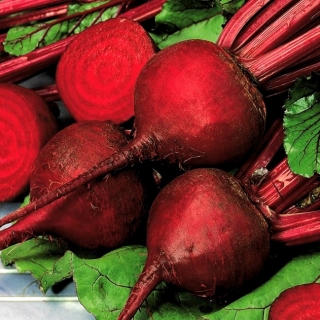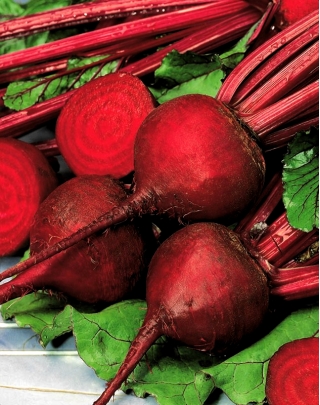The 'Ceryl' beetroot is a quickly growing variety that produces round roots. This vigorous, productive variety does not shoot flowering stalks and is tolerant to the majority of diseases, including the cercospora leaf spot of beets and powdery mildew. It produces evenly sized roots that consist of bright red flesh that is sheltered by tender, thin skin. It stands out with high betanin content. This feature makes it a popular choice among those who produces juice, concentrate and borscht extract. The round roots of the 'Ceryl' beetroot are also a great source of dyes used for adding colour to yoghurt, ice cream, jelly, cookies and fruit fillings. The variety that we present here is intended to be harvested for the ongoing consumption and long term storage. Beetroots are simply indispensable in Polish cuisine, as they are used in many traditional dishes. The roots taste great in salads, pickled, pressed to juice or processed to borscht.
The sow for the autumn harvest should take place between mid May and the beginning of June. Place the seeds 2 cm deep in rows 20 to 40 cm apart. Maintain 5 to 10 cm distances between plants.
Beetroots should be sown into the moderately moist soils that are rich in nutrients. This vegetable is sensitive to acidity of soil. It should be cultivated in earth with neutral reaction. It also requires sunny sites. It will not bring the desired yield when grown in shade and too densely. Beetroots tolerate the majority of soil types, hence will thrive in most gardens. They cannot stand waterlogged, acidic and predominantly sandy sites.
Red beetroot is a vegetable with many beneficial properties known to virtually everyone. It is a great source of valuable vitamins, elements and other compounds with medicinal properties. All these substances support the cardiovascular system, increase body resistance, protect from cancer, detoxify and deacidify the body.
One package contains 10+3 grams of seeds. The growing tips and the sow-by date were printed at the back of the package.
- Use: ongoing consumption; long-term storage
- Harvest time: autumn
- Site: sunny; moderately moist soil rich in nutrients with a close to neutral reaction
- Weight (in grams): 13 g
GardenSeedsMarket - has been in business for more than a decade and from the very beginning we have made the quality of our products the top priority. Throughout the years we have delivered the best quality goods to tens of thousands of customers from all over the world. Their satisfaction proves that we had chosen the right way.
All seeds we sell are subject to a multi-level quality control checks and only then are carefully packed and dispatched. Our products have been awarded numerous certificates and comply with the highest standards of the European Union. Our employees are experienced gardeners who are more than happy to answer your every question.
Where do our seeds come from?
All of the seeds sold in our shop come from the best producers from across the European Union. Thanks to a long-standing cooperation with them we were able to develop the most adequate storing and dispatch conditions, guaranteeing that you always receive fresh and carefully tested batches of seeds. Exclusion of the middlemen from the whole process not only makes it possible for us to avoid sending out-of-date seeds that might have been lying too long on a warehouse shelf, but also ensures the most attractive price for top quality products.
The quality control process
All our seeds must pass a four-stage quality control process.
Stage one begins with a careful selection of the suppliers. Than we proceed with controlling their crops, foreign producers are not excluded from the quality control process. Plants are checked at every stage of their development: when they start to grow, during blooming and when they start bearing fruit (seeds). At this stage the most important thing is to ensure proper spacing of the plants. Thanks to that obtaining the desired morphological characteristics of each particular species or variety, such as colour, height and shape, can be ensured.
Stage two consists of a detailed verification tests in laboratory conditions. With the use of the highest quality equipment by the highly qualified staff, our suppliers perform more than 30 000 quality checks annually. The seeds that do not meet our requirements are subject to technological refining processes, including drying, cleaning, upgrading and testing again.
Stage three starts with sowing seeds in selected control plots. That way we obtain valuable, exact information concerning their germination that must be maintained at an appropriate level. Simultaneously, the varietal identity of each species is checked at this stage.
Stage four takes place in our warehouses and consists of eliminating seeds that have been stored for too long on our shelves and replacing them with new batches. Each package is stamped with a unique batch number and also with the sow-by-date.
All four stages combined allow us to state with confidence that the seeds we deliver comply with the highest standards and have completed all required control stages with flying colours.
Prizes and awards
The seeds we sell are widely recognized for their quality and have won many awards. Our seeds won numerous gold medals and distinctions for their high quality. The World of Flowers was also honoured for its innovative approach.
Among those awards there were: TOP INNOVATION (June 2015), GOLD MEDAL AT THE POZNAN INTERNATIONAL FAIR (2015), CONSUMER QUALITY LEADER (2014), FARMER OF THE YEAR (2014).
In addition, we have also been awarded the “IDEAL BUSINESS” certificate for two years in a row.
Germination
We are committed to selling only the highest quality seeds. Taking into consideration the efforts we make daily, please also note that plants are living organisms and their germination and growth depends on many factors, such as temperature, soil type, humidity and the frequency with that they are watered, sowing time and conditions, use of fertilizers and plant protection agents (pesticides), as well as weather and climate conditions. We provide help by sharing the accurate and up-to-date sowing and growing information, however, we cannot bear any responsibility for the plants that were not cultivated in conditions appropriate for given species.







